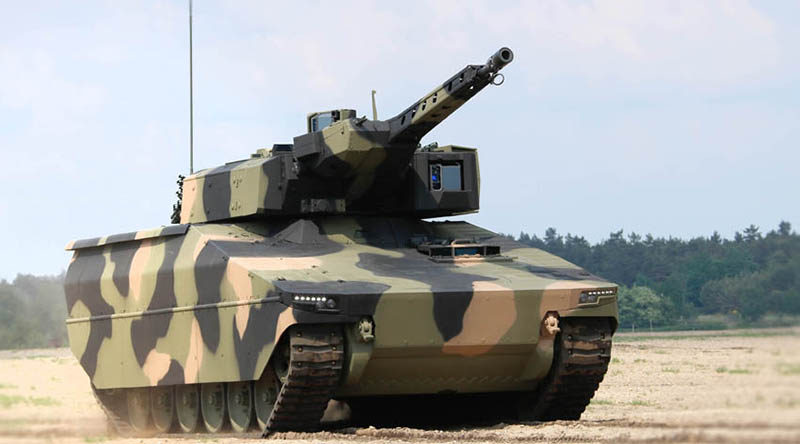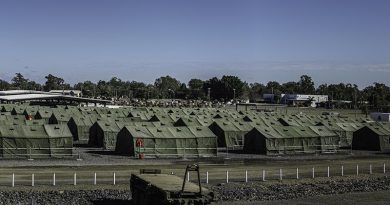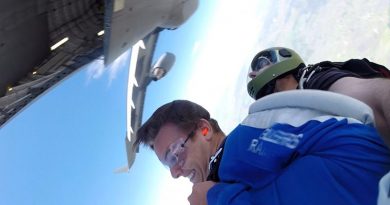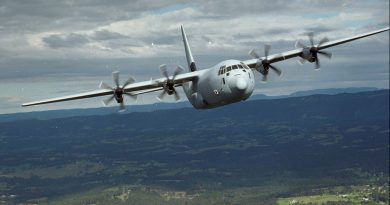M113 replacement project starts

The multi-billion dollar project to replace Army’s M113 Armoured Personnel Carriers has taken another step forward with the formal release of the Request for Tender for LAND 400 Phase 3 – Mounted Close Combat Capability.
Minister for Defence Marise Payne said the project will see Army’s capability significantly enhanced with a fleet of up to 450 modern Infantry Fighting Vehicles and 17 Manoeuvre Support Vehicles.
Key differences between this new tender and the recently announced Phase 2 (won by Rheinmetall’s Boxer CRV) is that there are more than double the number of vehicles required – and the winning vehicle will likely be a much heavier, definitely with more firepower, and roll on tracks (as opposed to wheels).
Rheinmetall’s Lynx, unveiled in Paris two years ago (pictured above in AusCam colour scheme) is a likely strong contender (not a biased assessment – we just had the picture on hand).
“This will be the largest investment in Army’s capability ever undertaken and will provide our troops with a modern close combat capability,” Minister Payne said.
“The vehicles will be equipped with high levels of protection, firepower and mobility that will enable sustained operations, varying from peacekeeping to close combat.”
Minister for Defence Industry Christopher Pyne said he encouraged Australian industry to get behind the project.
“I actively encourage Australian small and medium sized enterprises to take advantage of the significant opportunities arising from this project,” he said.
“Just as with the LAND 400 Phase 2 Combat Reconnaissance Vehicles, Australian industry involvement and Australian workers will be critically important to this project.”
Minister Pyne said that during this tender process, Defence would work closely with industry to optimise Australian-industry content.
“This project is another exciting opportunity for Australian industry to deliver leading edge technology in support of the Army,” he said.
Defence is placing greater emphasis on a coordinated and programmatic approach to Army’s biggest project ever.
“A new Armoured Vehicle Division will be created to consolidate large programs like LAND 400, LAND 907 – Main Battle Tank Replacement and LAND 8160 – Enhanced Gap Crossing Capability into a programmatic ‘mega project’.”
When fully delivered, the LAND 400 Program will allow Army to successfully sustain mounted close combat operations against emerging and future threats as part of a joint force.
The full tender can now be downloaded from the AusTender website at www.tenders.gov.au.
Submissions close on 1 March 2019.
.
.
.
.
.
.

.
.






I’m glad that these vehicles are not replacing but augmenting the M113’s. Having a vehicle in significant numbers that could work alongside and provide valuable armour support for mechanised infantry is a valuable capability and frees up CRV vehicles to provide further forward reconnaissance or additional combat power as needed. The venerable M113 despite its age is still one of the best combat infantry vehicles ever fielded and should be continually improved and upgraded. It would be good to see additional vehicles procured for a larger mechanised regular force as well as providing the same for reserve units, particularly in the north, but not limited to that region. There’s value in getting more urban ops training for our reservists using said vehicles.
Excellent Brian…….clear, concise and to the point…..self-delusion alive and well in Head Office…..LOL
Drove them in 66 in Germany,had 360 mopar engines then. Super soft Aluminum shells, like lead. You could stick an axe in the side and it would stick there. Pinhole the governor and punch hole in exhaust, then it would GO !
I actually rolled one off a hillside.w/ 12 guys inside, genuine E ticket ride. Ran bad upside-down…..
Saw one burn, it melted……
But all through the LAND400 project management process the various officers concerned had claimed it is *not* the intention to replace the M113!
Indeed, this is impossible to do because the requirement for “mounted close combat” is something the M113 achieved only when in use by the US Cavalry in Vietnam, and only by the troopers choosing to travel with open hatches and sand bags piled on the floor.
So, in a sense LAND400 Phase 3 is looking at creating a new capability for the Australian Mechanised Infantry, except this capability is doctrinally ‘up in the air’ since there is no doctrinal model for the Australian Army to follow.
For this reason the Army chose to go with a safe option for requirements…just get something that doesn’t tax the corporate mindset with anything new…like operations in the littoral…you know, Australia’s region of interest.
So how will this “winning vehicle will likely be a much heavier, definitely with more firepower, and roll on tracks (as opposed to wheels).” enhance Australia’s future security?
Apparently the Australian Army is staffed with professional military officers. They would know that strategic logistics determine deployability, not ‘firepower’. Given the BOXER is 34t, what is much heavier? The Germans have always liked heavy stuff, furniture, food, and of course armoured vehicles. PUMA is 43t, same as a Soviet T-80B medium tank or the Army’s old Leopard 1A4. The PUMA was built for the Soviet threat when the Cold War abruptly ended.
It was designed based on entirely faulty doctrinal premise that the Warsaw Pact wanted to have a head-on clash of armour, a myth Germans have convinced themselves, and rest of NATO since the Second World War. But how will this behemoth help defend Australia? The Army is no doubt claiming operational security on this answer, but the fact it it will not.
The truth is that the Australian Army is risk-averse like the rest of the APS. This risk aversion goes not only to making courageous decisions about the development of the Army into a service relevant to Australia’s Maritime Strategy and future security, but down to the unwarranted belief that more vehicle armour will render the Army victorious. If this were true, the USA would have secured a Capitalist Vietnam, the Iraq war would have lasted the scheduled six months, and Afghanistan would have been a model of market economy since 2002.
Indeed, Germans are very bad at both, doctrine of armoured warfare, and armoured vehicle design. They have three wars to prove this, Cold War included. So why is the Australian Army buying vehicles from losers?
Operational security…
About bloody time!!!!!